Academy for New European Political Economics e.V. Mission Statement
The 2008 global financial crisis painfully reminded us of what Keynes (and others) already had learned in the 1930s: despite being the dominant paradigm taught at universities world wide, neoclassical economics, having “no room for money” (Frank Hahn), has great trouble to coherently conceptualize or predict financial crises and deflationary depressions. Since in the Walrasian tradition, money is declared to be neutral by some implicit assumption, seen as nothing more than a numeraire and in effect abstracted from, this tradition treats the economy as if it were a real exchange (or barter) economy, as Keynes pointed out in 1933. In the words of Keynes, “One of the chief causes of confusion lies in the fact that the assumptions of the real-exchange economy have been tacit, and you will search treatises on real-exchange economics in vain for any express statement of the simplifications introduced or for the relationship of its hypothetical conclusions to the facts of the real world. We are not told what conditions have to be fulfilled if money is to be neutral. Nor is it easy to supply the gap.” (Keynes 1933)
Like after 1929ff, after 2008ff the search for a new and better (monetary) theory of capitalism has been intensified and entered public consciousness. Heterodox – including post keynesian – approaches are receiving renewed attention, but a coherent new integrative paradigm is still lacking. Such a paradigm will eventually emerge. The Academy for New European Political Economics aims at contributing to this process through independent conceptual work and active engagement in public and academic discourse.
From our perspective, four essential core elements for a new paradigm are emerging and need to be brought together: (1) the historically specific legal institutional foundations of credit and the financial system in roman (private and public) law, i.e. property&contract law and taxation, as conceptualized in the emerging fields of legal institutionalism and the legal theory of finance, including the insights that assets and debt are legally constructed and market volatility results from nominally variable property rights (“free prices”) and nominally fixed contracts (“pacta sunt servanda”); (2) monetary (nominal) economics based on business accounting (as used in Modern Monetary Theory and Stock Flow Consistent Modelling), coherent micro-macro integration by way of accounting identities and mechanics of balances and the bipartite division of monetary theory into stocks&flows of (a) means of payment and (b) net financial assets (as developed by german economist Wolfgang Stützel). (3) Stützels insight that the Walrasian assumption leading to the neutrality of money is simply “lockstep” of revenues and expenditures: if all economic units spend exactly as much as they earn during a period, their net financial assets (means of payment + financial assets minus financial liabilities) will remain unchanged, and any kind of “money” (in the sense of net financial assets, including means of payment) will remain neutral. In addition, (4) standard insights from comparative legal and economic anthropology and -history have to be added to be able to identify the conflicting relationship between modern formal legal institutions and traditional reciprocity, a field of tension within which neopatrimonialism, clientelism and informal practices reside: understanding this tension is directly relevant for development and transition economies, including some EU and even Eurozone countries.
Despite of its global dominance, western civilization and its political economy is a historically specific form of social organization that can not be fully explained by any universalist theory. Through rediscovering and reevaluating the history of western civilization in context to global cross-cultural comparison, its developments up to the 21st century are to be newly described in the light of the developments since 2008. Thus, systematic cross-cultural and historical comparison is the integral methodical tool for our efforts to re-evaluate the current situation, and to develop appropriate new political solutions and strategies.
This is an overview of our research program:
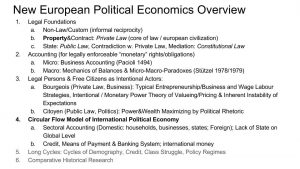
The foundational distinctions of our model are summarized in the following images:
Western Civilization
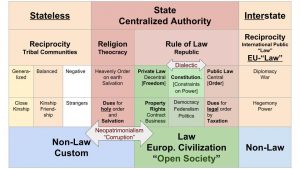
Law-Accounting-Finance Connection
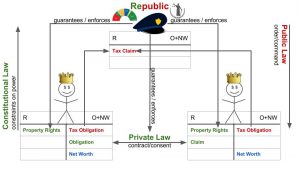
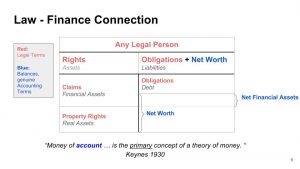
“Money”
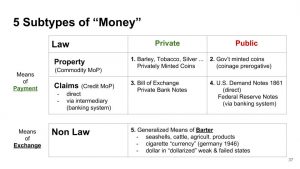
Bourgeois (Business) and Citoyen (Politics): Political Economy
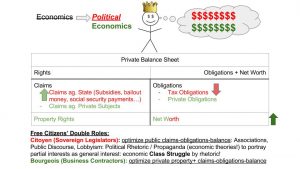
Micro-Macro-Integration
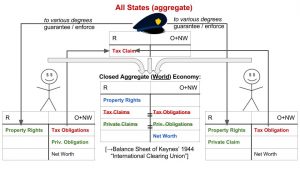
Some more detailed interim results of our work in the form of Presentations (videos) and papers can be found here and here. Some more information about who we are can be found here.
We are available for presentations, speeches and transdisciplinary seminars, aiming at enabling fruitful cross-disciplinary communication between lawyers, entrepreneurs and accountants, monetary macroeconomists, political scientists, historians and anthropologists through a set of integrating concepts fundamental to western civilization and its specific form of modern capitalism.
Contact us at andreas.tittert[at]anep-economics[dot]org.
